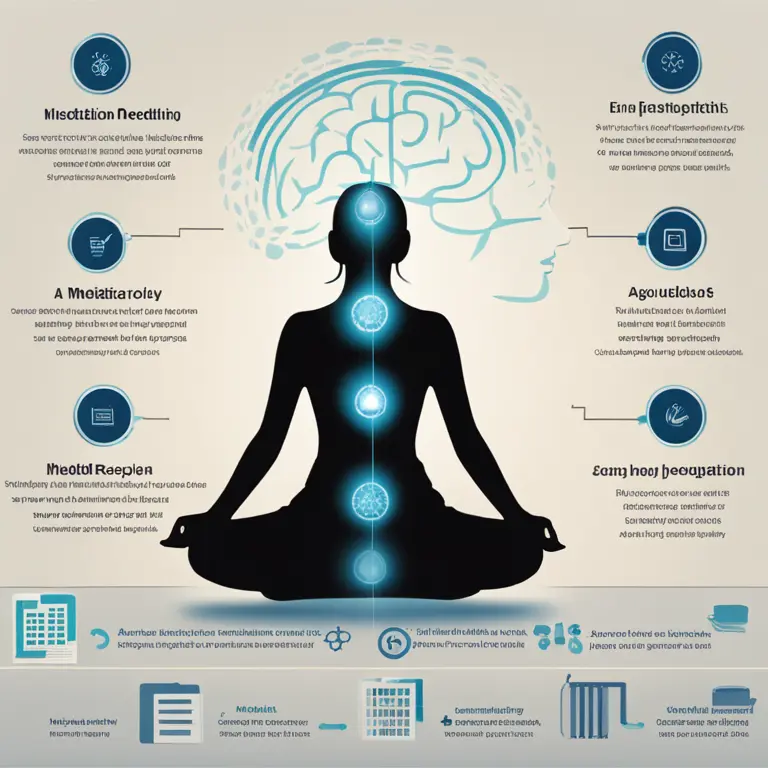
Healing Through Mindfulness: A Meditation Guide for Recovery
Discover the transformative power of mindfulness meditation in the healing journey, offering a serene path to recovery and inner peace.
article by Hina Kurosawa
Mindfulness: A Holistic Approach to Recovery
Meditation is widely recognized for its healing properties, with mindfulness being a particularly effective method. Mindfulness meditation facilitates a non-judgmental awareness of the present moment, empowering individuals to observe thoughts and feelings without being overwhelmed by them. This practice is especially beneficial for those in recovery, as it fosters emotional resilience, aids in the management of stress, and promotes a sense of calm. By focusing on the here and now, mindfulness meditation encourages individuals in recovery to cultivate a peaceful inner landscape, laying the groundwork for sustained healing.

Establishing a Mindfulness Meditation Routine
To reap the full benefits of mindfulness meditation, establishing a regular practice is key. Starting with just a few minutes each day, one can gradually extend the duration as comfort and concentration levels improve. The ideal setting is a quiet space, free from distractions. Practitioners can either sit or lie down, focusing on their breath or a chosen object or sound. Consistency in this routine not only enhances mental clarity but also strengthens the resolve to stay on the path of recovery.

The Science Behind Meditation and Recovery
Research as of 2024 continues to affirm the physiological impact of mindfulness meditation on the brain. This practice has been shown to reduce activity in the amygdala, the region associated with stress and fear responses. Additionally, it enhances connectivity between brain regions tied to self-regulation and attention. For individuals in recovery, this means improved emotional control, reduced cravings, and an enhanced ability to cope with triggers, making mindfulness meditation a valuable component of a holistic recovery plan.

The Elevation of Emotional Intelligence
Regular engagement in mindfulness meditation profoundly influences one's emotional intelligence. By becoming more attuned to their emotional states, individuals learn to navigate complex feelings with greater ease. This heightened self-awareness is crucial during recovery, as it allows for the recognition and processing of emotions that may otherwise lead to relapse. Enhanced emotional intelligence, cultivated through mindfulness, fosters healthier relationships with oneself and others, integral to a successful recovery journey.

Incorporating Mindfulness Into Daily Life
While formal meditation is beneficial, the principles of mindfulness can be woven into everyday life. Mindful eating, walking, and listening are all practices that support a state of active presence. During recovery, small acts of mindfulness can make a significant difference, as they provide practical tools for managing the stresses of daily life. By embracing mindfulness in both structured and spontaneous ways, individuals solidify their foundation for lasting recovery.
Challenges and Support on the Path to Recovery
Though the journey through mindfulness meditation is deeply rewarding, it is not without challenge. Beginners may encounter barriers such as restlessness, self-doubt, or impatience. It's important to seek support from mindfulness groups, counselors, or recovery programs, particularly those that understand the unique benefits of meditation. Group sessions can offer encouragement and shared experiences that reinforce personal practice and the commitment to recovery.
Continued Growth and Lifelong Healing
Mindfulness meditation is not just a tool for immediate recovery; it's a lifelong companion that supports continuous growth and healing. As one's practice deepens, the ability to stay centered and composed becomes second nature, fostering a sustainable and fulfilling recovery. Mindfulness empowers individuals to lead a life defined not by past struggles, but by a renewed sense of peace, purpose, and connection.
Published: 1/18/2024
Modified: 1/18/2024
More predictions
Come back here soon to learn more about yourself and your future


Mastering The Path Of Mindfulness Meditation
Discover the serene path of mindfulness meditation with this comprehensive guide designed to help you find inner peace and clarity.


A Short Guide to Mindfulness Meditation
Embark on a journey of self-awareness and tranquility with this comprehensive guide to mindfulness meditation.


Mindful Teaching: Meditation Practices for Educators
Discover the benefits of mindfulness meditation for educators seeking balance, enhanced concentration, and emotional wellbeing in a demanding profession.